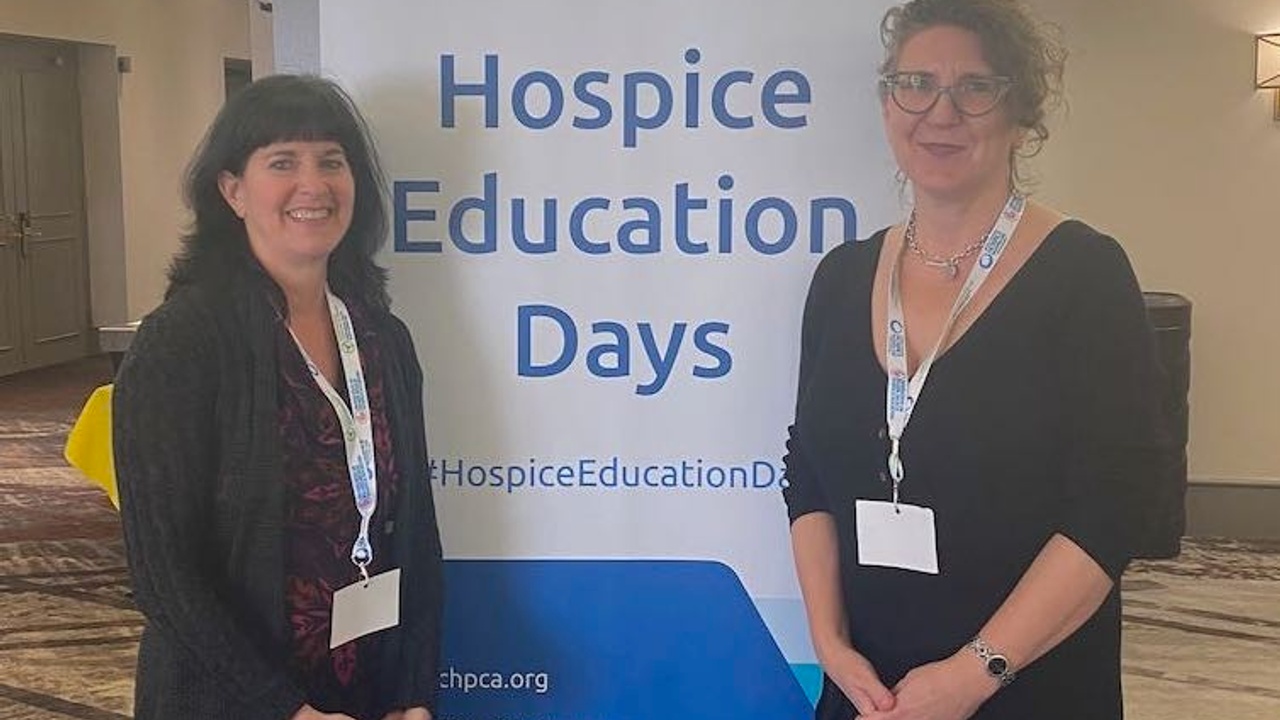
Four New Things I Learned About Grief and End-of-Life Care
Oct 31, 2022(Photo: Reena Lazar and Christa Ovenell attend the Hospice Education Days on October 28, 2022)
Just when I thought I knew everything there was to know about grief and end-of-life care, guess what? I learned a few things and opened my heart a bit more. I spent a day last week at a conference titled, “Working within the Complexities of Grief” part of Hospice Education Days organized by the Hospice and Palliative Care Society of BC. Here are four highlights.
1. Anything that helps diminish isolation is medicine.
Heather Mohan of the Lumara Society shared powerful testimonials about the impact that being in community has on the attendees of Camp Kerry, Canada’s very first family grief retreat program. Started 15 years ago, many of the attendees return summer after summer and see their experience there, as a life-saver. Lumara will be hosting a virtual grief conference for families and professionals, called Kaleidoscope happening from November 4-6, 2022.
2. We can all help ease the way for end-of-life care in the Queer Community.
Tiana Dargent of Queer Community Deathcare explained that people in the Queer (2SLGBTQIA+) community face multiple personal, interpersonal and systemic roadblocks that make the grieving and care process extra challenging. Here are some ways you can help to remove those roadblocks:
- Expand your personal relationships to include people who identify as Queer.
- Normalize interacting with all kinds of bodies, so that when/if you are caring for someone whose body doesn’t fit into the norm, it won’t be uncomfortable for you.
- Always offer your pronouns to help build an environment where everyone can offer theirs freely without fear.
- Be supportive of diverse relationship styles and kinships.
3. Spiritual Care for the dying is an integral part of grief support.
In Mark Hensman's presentation titled, Seasons of Spiritual Care at The Margins of Life he made the case that we are all spiritual caregivers because we’re all spiritual beings. He also demonstrated that spirituality as a form of comfort to the dying can be expressed in many ways, whether the person identifies as religious or not. In his role as the Lead Chaplain at Grace Health Services he has learned that the greatest resource when he walks into a patient’s room is himself offering his time and presence.
4. We need to engage people with death education long before they get to that reality.
OK, so this last point isn’t new to me. It’s the reason Willow exists. Mark Hensmen explained how it’s one of the factors that has significant implications on spiritual care. What I understand from that, is that people who have engaged in the reality of their own mortality long before they’re at the end of their life, are far more open to the broad spectrum of spiritual care when they get there. As a result their dying days will be more peaceful.
While suffering is a part of being alive, the more we try to hide from it, the more we’ll suffer. Just like grief is a constant journey, so is death education. If you’re grieving someone or you are fearful of the impacts of your own inevitable death and dying, then I invite you to begin or continue your journey with death education. Here are two steps you can take:
- Download Willow’s FREE Brief on Grief and Mourning. It’s Willow's summary of wisdom from thought leaders in this field.
- Head on over to Willow’s events page and sign up for a virtual or In-person workshop that interests you.
Finally, if any of these “lessons” inspired you, please share this post with others so they can be inspired too.
What about you?
What lessons have you learned about grief that you would like to share with others?



